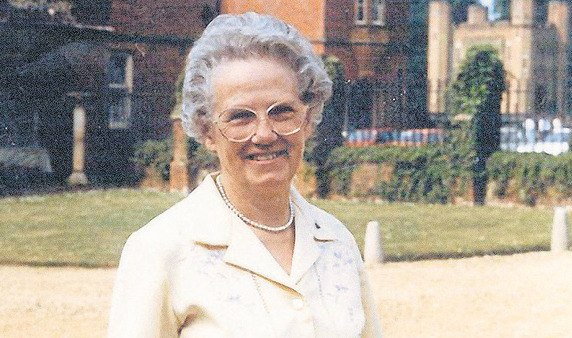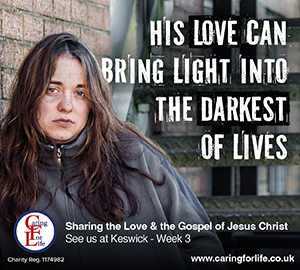Helen Roseveare 1925–2016
Julia Cameron reflects on the remarkable life and ministry of Dr Helen Roseveare, who died on 7 December 2016 aged 91
Julia Cameron

Helen Roseveare is widely-recognised as one of the most courageous and influential missionaries of the 20th century.
She served in the Belgian Congo (later Zaire, now DRC) for 20 years, from 1953 to 1973, then had a long and fruitful ministry in writing and speaking.
Early spiritual life
In her first week as a medical student at Cambridge, Helen was drawn into the orbit of the Cambridge Inter-Collegiate Christian Union (CICCU). Her family was high church, so she went to Mass and Confession, but found no real welcome from the clergy. By contrast, her friends invited her to CICCU’s weekly evangelistic address, where there was warmth and spiritual vitality.
Her friends later took her to a houseparty, and here she found faith in Christ. She bought a new Bible from the bookstall, and asked the speaker, Graham Scroggie, to write a verse in it. He chose Philippians 3.10, explaining that she now knew Christ, and would come to know the power of his resurrection. Then looking her straight in the eye he said: ‘And maybe one day God will give you the privilege of sharing in his sufferings.’ Indeed that priceless privilege would come. And through it, for the rest of her life, there was a sparkle in her eyes and a radiance in her smile whenever she spoke of Christ.
Missionary candidate
Helen Margaret Roseveare, the second of five children born to Sir Martin and Lady (Edith) Roseveare, was educated at Howell’s School in Denbigh before going up to Cambridge. Her father taught maths at Haileybury College, and was then appointed as a schools inspector, before being seconded at the outbreak of war to the Ministry of Food. Here he masterminded a national scheme for food rationing and introduced ration books.
At Cambridge, Helen gained blues in hockey and cricket. It was natural for her to share her faith with friends and to invite them to meetings. Her friend Olga Rutherford (later Abrahams), fellow cricketer and President of the Cambridge Women’s Communist Society, seemed an unlikely convert; but through Helen’s witness she found faith in Christ and joined OMF, to serve for 30 years in Japan.
While training at the West London Hospital, Helen Roseveare was invited to hear a speaker from WEC (now Worldwide Evangelisation for Christ). That very evening she knew she wanted to join this mission, and soon moved into its headquarters, commuting from there to the hospital.
Helen was clearly able, an achiever and a leader. But her quick mind, her energy and her dogged commitment – always wanting more and better – were not easy for those around her to handle. Called from her work in the WEC laundry one day, to take a tray of teacups to a committee meeting, she found herself in a dire situation. Having nudged her way though a heavy swing door, she was walking through the library adjoining the meeting, carrying the tray. Unbeknown to her, it was the meeting which would determine her candidacy; and she at that moment was being discussed. ‘Proud, always knowing better than others, unable to be told things or warned or criticised, difficult to live with.’ Escaping back to the laundry as soon as she could, she hung out the washing, only to see it blown down into mud. Perhaps as a release of tension, she found herself laughing out loud. The committee had witnessed the incident through the window. Her ability to laugh changed their minds. She was accepted as a member of the mission.
She sailed for the Congo in 1953, after initial language study in Belgium and training in Tropical Medicine. After two years in a small mud-and-thatch clinic, she moved seven miles north to Nebobongo, where she would establish a teaching base for nurses and some 48 satellite bush clinics. This hospital served a radius of 150 miles.
Furlough and return
Helen arrived back in the UK for her first furlough in 1958 and worked in Mildmay Hospital to update her skills. Vulnerable to doubt about her future, she resigned from WEC – it was too lonely for a single woman and she was exhausted. By the age of 30, she had been handed responsibility for setting up a medical training centre on the site of a former Red Cross leper colony which had largely reverted to jungle. Her nursing students had to act first as construction workers. Kilns had to be built to create bricks and building skills had to be acquired from manuals. It had been a very taxing time.
She was encouraged to return to Congo in 1960, the year of the country’s independence. The new nation soon descended into a period of unrest and instability, leading to what became known as ‘the Congo crisis’, five years of brutality and destruction.
By 1964 the Simba uprising brought real danger. Rebel soldiers carried out unspeakable acts. Helen and several co-workers were placed under arrest for five months, not knowing if and when death would come, amid savage beatings and, for Helen, rape. Through the dark abuse of these months, she sensed the Lord saying: ‘These are not your sufferings. They’re mine. All I ask of you is the loan of your body.’ She wrote later of her ‘overwhelming sense of privilege, that Almighty God would stoop to ask of me, a mere nobody in a forest clearing in the jungles of Africa, something he needed.’
After another period of rest in the UK, Helen went back to the Congo in 1966 to establish the Nyankunde Nursing School before returning home in 1973 to share in caring for her mother. Eleven children of the Nyankunde Nursing School students have gone on to medical school. One of these is now Medical Director of Nebobongo Hospital.
Speaker and writer
Helen Roseveare’s life then took on a different dimension, as she became widely sought-after as a speaker on both sides of the Atlantic. She spoke with passion of her love for Christ. It was clear to listeners that she shared a deep sense of fellowship with him. Hers was a serious discipleship, which looked back continually to Philippians 3.10 as the lens through which to see her time in Africa. Her first book, Give Me This Mountain (1966), was followed by He Gave Us A Valley (1976). It is not surprising that when asked by WEC leadership to write a paper on being a single woman in mission, she replied that she couldn’t. ‘I’ve done the work of a man for years!’ she said.
On one North American trip (1975-76) Helen Roseveare addressed 400 meetings in nine months. This tour was agreed after her mother had stabilised, with the support of the whole family. But to her great grief, her mother died ten days after the itinerary began. Halfway through the trip, Helen discovered a tumour, but chose not to mention it to anyone until she got home. There is no small cost to itinerant speaking.
Dr Helen, as she was known, could command audiences of thousands while engaging her listeners personally. She loved to address students and was a plenary speaker at three of the North American Urbana Missions Conventions. Part of her love for speaking to students surely came from the fact that her own life’s course had been set while an undergraduate.
Belfast base
From 1977, Helen was a committed member of St Elizabeth’s, Dundonald, on the east side of Belfast, serving in a range of roles, including Church Treasurer and Building Fund Treasurer. St Elizabeth’s became her sending base as she continued to travel widely until she was in her mid-eighties. She shared a home with Dr Pat Morton, a cardiologist and a good friend of many years, who after retirement would sometimes accompany her on speaking tours, including a return trip to Congo.
Helen Roseveare’s third published reflection on her life, Digging Ditches, appeared in 2005. The title was taken from the Lord’s word to Elisha to ‘make this valley full of ditches’ (2 Kings 3.16). While Helen would have wanted to ‘dig a Suez Canal’ the Lord wanted only small ditches, many of them, for him to show his provision in his own way. He wanted obedience, so he could bring blessing in conversations, through visiting – in the ordinary things in life.
Her other books include Living Sacrifice (1979), Living Faith (1980), Living Holiness (1986), Living Fellowship (1992), and On Track: the story of the Girl Crusaders’ Union 1915-1990 (1990). Her final book Enough appeared in 2011.
She was a lifetime Honorary Vice President of the CICCU and Honorary President and Vice President of the Girl Crusaders’ Union for almost 20 years.
For the Nursing School in Congo, Dr Helen created the motto Pour Lui, tout à fait (totally for Jesus). To the end of her life, she lived it out.
Julia Cameron lives in Oxford and works for the Lausanne Movement.


